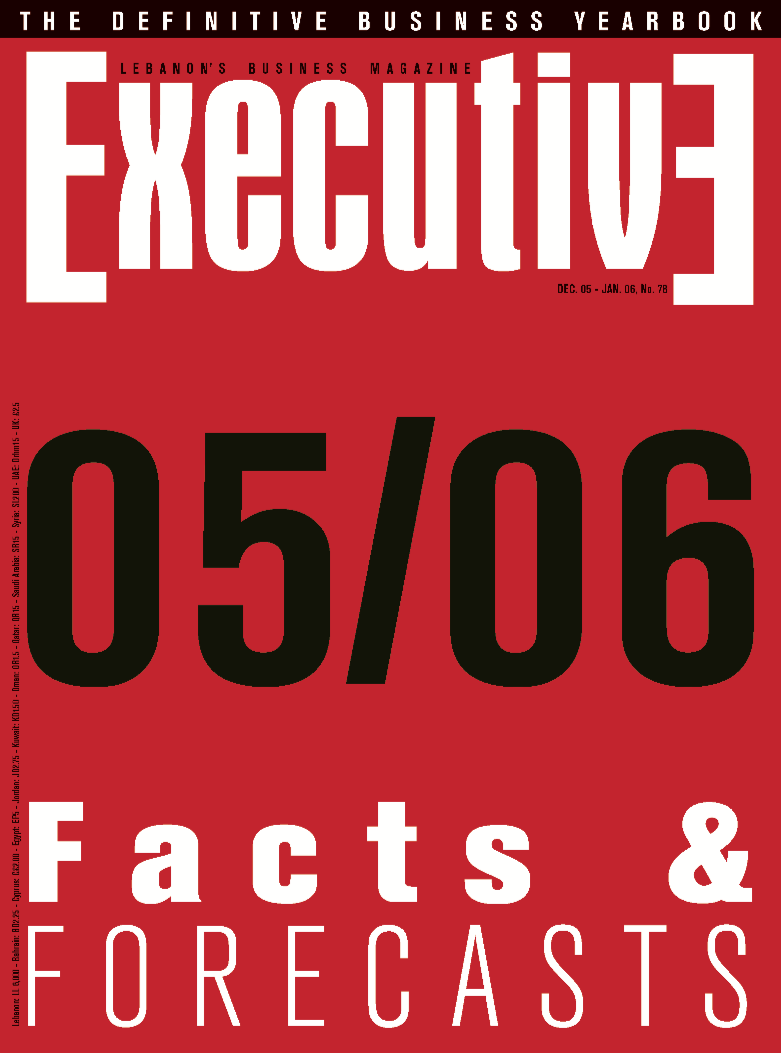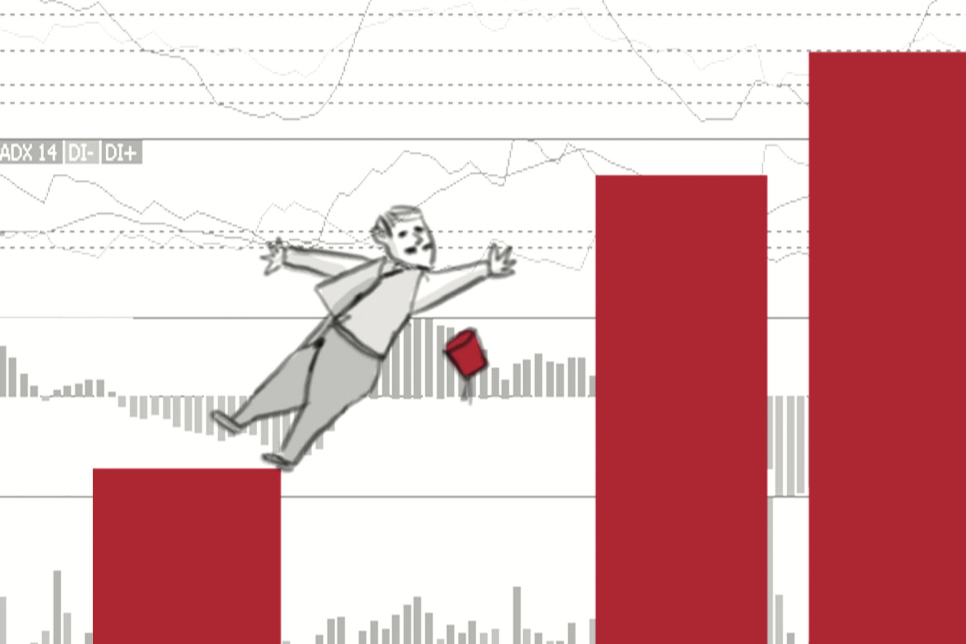January 2006
Beirut experiences a relatively muted new year after the killing of MP Gibran Tueni and the revelations of former Syrian Vice President Abdel-Halim Khaddam on Arabic satellite TV. Among his many accusations is the charge that Brigadier General Rustom Ghazaleh, acting as what he called Syria’s “viceroy” in Lebanon, stole $35 million from al-Madina Bank and regularly insulted and threatened Lebanese leaders. In another interview, Khaddam reveals that Syria sought Spanish mediation to prevent Security Council member-states from adopting Resolution 1559. In return, he offered to abandon his plan to extend President Lahoud’s mandate. British Foreign Secretary Jack Straw arrives in Beirut for talks with Prime Minister Fuad Siniora but does not see President Emile Lahoud. Siniora is locked in talks with Hizbullah leader Sayyed Hassan Nasrallah to resolve the Cabinet crisis. Local media reports that Belgian prosecutor Serge Brammertz will be named as successor of outgoing chief UN investigator Detlev Mehlis. Syrian President Assad announces he will not appear before the UN commission. The announcement comes as UN Secretary General Kofi Annan formally appoints Brammertz as successor to Mehlis in the UN probe into the slaying of ex-premier Rafik Hariri. Arab diplomatic efforts to find a solution to the crisis reach a deadlock as talks between Siniora and Hosni Mubarak in Egypt and Saad Hariri and Jacques Chirac in France strengthen resolve to reject any deal with Syria. The UN investigating commission questions brigadier Rustom Ghazaleh and his assistant colonel Samih al-Kasha’ami in Vienna. Israeli Chief-of-Staff Dan Halutz warns that Israel would strike at Lebanese infrastructure targets if his country felt it necessary. His words come at a time when tensions between Iran, which supports Hizbullah, and the Jewish state reach an all-time low. Riot police use tear gas and water cannon in Beirut’s Riad al-Solh square to disperse 250 pro-Syria demonstrators protesting the visit to Beirut by US Assistant Secretary of State for Near Eastern Affairs David Welch. In another anti-American demonstration, this time outside the embassy in Awkar, former legislator Zaher al-Khatib pledges allegiance to Iranian President Mahmoud Ahmadinejad, Assad and the Iraqi insurgency. The Agriculture Ministry insists all domestic birds, including poultry, be kept indoors following news of increased incidents of bird flu in Turkey. Official statistics reveal that 700 people died on Lebanon’s roads in 2005, a rise of 20%. Nasrallah calls on all Arab nations to help resolve the crisis between pro and anti-Syrian Lebanese factions that he says threatens to polarize the country and divide the government. The US Treasury freezes the assets of Syrian military intelligence chief Assef Shawkat, brother-in-law of President Assad, accusing him of being a sponsor of terror. US President George W. Bush meets MP Saad Hariri and reaffirms the United States’ support for Lebanon and its rejection of any deal that may compromise the country’s independence. Brammertz, the new head of the UN Hariri probe meets Lahoud, who calls for a swift conclusion to the investigation which he hopes will “uncover the terrorist plot that is targeting Lebanon.” Ghassan Tueni returns to Parliament to fill his son’s seat as Lebanon’s most senior MP Edmond Naim dies. He was 88. Michel Aoun’s Free Patriotic Movement announces that his party, in an alliance with Hizbullah, will contest Naim’s vacant seat in Baabda-Aley. Bosta, a musical comedy, takes top spot at the box office beating off competition from major foreign films. Malaysia-based Lebanese businessman Elie Youssef Najem tells officials in Kuala Lumpur, investigating his role in a bogus charity pledge, that he is worth $46 billion dollars and is Canadian lord and a Lebanese prince.
February 2006
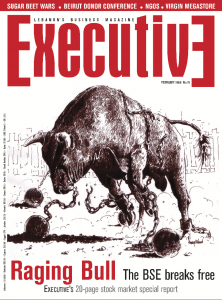
Hizbullah joins Arab nations in urging Denmark and Norway to apologize for the defamation of Islam in their press through the publication of cartoons depicting the Prophet Mohammed. Norwegian diplomat Raymond Johansen meets Foreign Minister Fawzi Salloukh, calling the cartoon incident “unfortunate and regrettable.” Johansen’s apology does not appear to go far enough: the following Sunday, demonstrators from all over Lebanon descend on Beirut and set fire to the Danish consulate in Tabaris. Some 2,000 troops and police use tear gas and fire their weapons in the air in an attempt to calm the situation, but the protest quickly degenerates into mob violence. At least 30 people are injured, including policemen and firefighters. As Muslim clerics appeal for calm, protesters stone the nearby St. Maroun Church as well as attack cars and buildings in Ashrafieh. Danish embassy staff had been evacuated two days earlier, in anticipation of protests. During an emergency meeting of cabinet, the government apologizes to Denmark and Interior Minister Hassan al-Sabaa resigns. General Michel Aoun calls for the whole cabinet to step down. Over 300 people are arrested for their alleged role in the riot. The majority belong to the radical Islamist group, Osbat al-Ansar. Anti-Syria politicians launch a day of protest against Presidents Emile Lahoud and Bashar Assad as they address over 500,000 Lebanese in Martyrs’ Square to commemorate the one-year anniversary of former Prime Minister Rafik Hariri’s killing. Among the speakers are Saad Hariri, Walid Jumblat and Samir Geagea, all of whom, after paying tribute to Hariri and others killed during 2005, pledge to remove the president, whom they refer to as the “symbol of domination.” At 12:55, the exact time of the blast, the crowd observes a minute’s silence. Aoun’s Free Patriotic Movement, Hizbullah and Amal all send representatives. The next day, Telecommunications Minister Marwan Hamadeh says that members of the March 14 coalition have commissioned legal experts to prepare a constitutional text that would enable parliament to end Lahoud’s term, as US Secretary of State Condoleezza Rice hints that Lahoud should step down. Meanwhile, a statement from Baabda palace says that, “the president is determined to live up to his oath until the very last moment of his constitutional mandate.” Saad Hariri accuses Lahoud of being complicit in his father’s assassination. Lebanon plunges into further political crisis as 17 out of the 24-member cabinet refuse to attend the weekly cabinet meeting at Baabda. That same day, Hassan Nasrallah demands the crisis be solved by “broad national dialogue.” The events unfold as Condoleezza Rice visits Lebanon to hold talks with Prime Minister Fuad Siniora and meets Salloukh, Maronite Patriarch Nasrallah Sfeir, Druze leader Jumblat and Saad Hariri. She does not see Lahoud The March 14 coalition drafts two petitions to invalidate the legitimacy of the presidency and remove Lahoud from office. One is signed by 14 deputies who swear they were forced by Syria to vote in favor of the extension of Lahoud’s term. The presidency has warned that the Presidential Guard Brigade would not hesitate to use force in the event of mass protests at Baabda. Meanwhile, Nasrallah says that Hizbullah’s weapons would only be used to defend Lebanon, not the Shia community. Aoun accuses the March 14 coalition of abusing its position by calling for the ousting of Lahoud. After DNA testing, human remains found in Anjar are positively identified as those of French hostage Michel Seurat who was abducted in Lebanon in 1985. A news story in Al Anwar reports that Lahoud believes Israeli agents, masquerading as Syrian assassins, are plotting to kill him.
March 2006
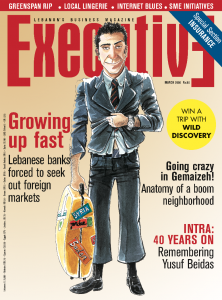
Along-awaited national dialogue begins at the parliament building, bringing together political parties and leaders, many of whom have not met for years. They include Hassan Nasrallah, Walid Jumblat, Saad Hariri, Michel Aoun and Samir Geagea as well as Prime Minister Fuad Siniora and Speaker Nabih Berri. Shops and businesses in the BCD are shut for the duration. Ghassan Tueni and Michel Murr are chosen to represent the heavily contested Greek Orthodox representation. Three pro-Syrians are excluded at the request of the March 14 leaders. In an opening speech, Berri announces that the three main topics for the dialogue include uncovering the truth about Rafik Hariri’s assassination, UN Resolution 1559 and Lebanese-Syrian relations. He says that the issue of President Emile Lahoud’s resignation will also be discussed as it falls under Resolution 1559. Lahoud is not invited to the conference. As the talks enter their fourth day, there are reports that participants have already agreed on the ending President Lahoud’s term. Geagea announces “The current presidency is over. We are in the process of searching for a new president.” Meanwhile, Finance Minister Jihad Azour calls on leaders at the national dialogue to add economic issues to their already-packed agenda, declaring that “the constructive and positive dialogue will not be comprehensive if it does not address economic problems and social concerns raised by the citizens.” The national dialogue stalls following a dispute between Druze leader Walid Jumblat and Hizbullah’s Hassan Nasrallah. It resumes six days later, after Jumblat holds talks in Washington with Secretary of State Condoleezza Rice and other high-ranking US officials. In New York, he meets UN Secretary-General Kofi Annan and ambassadors for the five permanent members of the Security Council. He calls on the US to intensify pressure on Syria to free Lebanon from Damascus’ influence and calls on Hizbullah to behave like other militias and surrender their arms. Meanwhile, after much lobbying from restaurant and bar owners, downtown opens for business as the national dialogue resumes. However, owners remain pessimistic as parking restrictions and road closures remain in force. Lebanese Forces leader Samir Geagea has said that the anti-Syria coalition may have to return to its original plan to oust Lahoud through street protests if national dialogue talks fail to resolve the issue. Syrian President Bashar Assad calls the March 14 leaders “useless instruments” in the hands of foreign powers that use them to undermine Syria and Hizbullah. The body of Frenchman, Michel Seurat kidnapped more than 20 years ago in southern Beirut, is flown to Paris with full military honors. The UN commission investigating Hariri’s assassination publishes a new 25-page report in which it says it is closer to understanding the circumstances surrounding the killing. 10 Lebanese soldiers killed during the 1975-90 civil are buried with full military honors after an official ceremony at a military hospital. They are awarded the Badge of War and the Wounded. Assad agrees to meet the UN Hariri commission but stresses it is a “meeting” not an “interrogation.” Annan says that a mixed Lebanese and international court should be convened to prosecute those charged in the Hariri assassination. Interior Minister Ahmed Fatfat announces that Pierre Dakkash has won an uncontested parliamentary seat in the Baabda-Aley by-election. Forbes lists Hind Hariri, the daughter of the late Rafik Hariri, as the world’s youngest billionaire with a fortune of $1.4 billion. The Free Patriotic Movement announces it will create an independent TV station. Bekaa poultry farmers stage protest at recent losses incurred by the bird flu scare, dumping eggs and live chickens.
April 2006
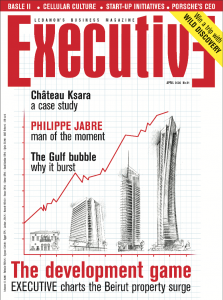
President Emile Lahoud and Prime Minister Fuad Siniora argue over a draft resolution pledging support for Hizbullah during a session of the Arab summit in Khartoum. Siniora demands the removal of the clause that pledges support for the armed “Lebanese resistance.” Earlier, Syrian President Bashar Assad and Lebanese Siniora shake hands on the sidelines of the Arab summit in Khartoum, despite heightened tensions between the two neighbors. Later in the week, a cabinet meeting ends in pandemonium after ministers from the March 14 coalition, in particular Telecom minister Marwan Hamadeh and Interior Minister Ahmed Fatfat, hurl abuse at Lahoud before walking out. The incident, captured live by local news cameras, threatens a political crisis, coming just two days after the spat in Khartoum. Things get worse for the president as Patriarch Nasrallah Boutros Sfeir, talking to the French magazine Le Point, says Lahoud is no longer fit to fill the country’s top executive post. Finance Minister Jihad Azour announces the successful closing of a five-year, LL400 billion ($265 million) bond with a yield of 9.4% to further finance the public debt. The tourism ministry also has good news, proclaiming that nearly 70,000 tourists visited Lebanon during February, a 40% year-on-year increase. The Lebanese poultry market claims a 50% contraction since January due to the nationwide fear of avian flu. The news comes as poultry farms in southern Lebanon are hit by a less dangerous H7 form of the virus. US Ambassador Jeffrey Feltman says that Lebanon‘s economy is living on “borrowed time,” as the European Union urges Lebanon to speed up the launch of its long-awaited economic reforms. Meanwhile, Solidere announces net profits of $108.5 million for 2005. The figure is double the $54.1 million achieved in 2004. US Secretary of State Condoleezza Rice, speaking in Washington, says that the biggest problem faced by Lebanon is Hizbullah and its relationship with Iran and Syria. Siniora meets US President George Bush and and urges an Israeli withdraw from the disputed Shebaa Farms as Saad Hariri holds talks with French President Jacques Chirac, who urges Lebanon to adopt economic reforms and calls on the international community to boost economic support for Lebanon. Meanwhile, Michel Aoun asks the parliamentary majority to apologize to Lahoud for insulting him and invites him to participate in national dialogue talks. The General also predicts the disintegration of the March 14 anti-Damascus alliance when the national dialogue resumes. The finance ministry announces that the government has abandoned plans to issue $850 million worth of Eurobonds after former mobile phone operator, LibanCell, seeks court action to freeze assets of the Lebanese government abroad, claiming it is owed $266 million by the state. Siniora says he believes that Lahoud is “not free” to resign, hinting that Syria may harm him if he steps down. A delegation from Hizbullah visits Tehran where it meets Iranian President Mahmoud Ahmadinejad to congratulate him on his country’s success in uranium enrichment. March 14 politician Walid Jumblat says he expects more security alerts in the run-up to the next report by the United Nations team investigating the murder of ex-Prime Minister Rafik Hariri. Australian-Lebanese crime boss “Fat” Tony Mokbel flees Lebanon after being convicted of drug trafficking and suspected of involvement in gang killings in Australia. Three lucky ticket holders win almost $5 million in prize money as the Lotto numbers are drawn. A Roman burial cave containing a human skeleton, gold leaves, glass rings and other artifacts is discovered by laborers in Baalbek. They are left unattended and later stolen.
May 2006
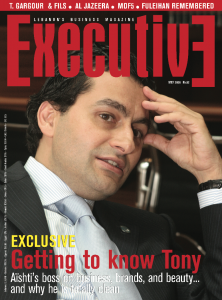
Lebanon’s leaders once again fail to agree on the fate of President Emile Lahoud and the issue of Hizbullah’s weapons. Speaker Nabih Berri refuses to confirm reports that four presidential candidates—Michel Aoun, Nayla Mouawad, Boutros Harb and Nassib Lahoud—were proposed during the session. The talks are adjourned until May 16, but that dialogue also ends in stalemate and is further adjourned until June 8. Lebanon gives a one-year extension to the mandate of chief UN investigator, Serge Brammertz, who is leading the probe into former Prime Minister Rafik Hariri’s assassination. Solidere announces that a Kuwaiti investment group intends to build a $1.3 billion, 206,000m2 (BUA) mixed-use development in the BCD as Solidere chairman Nasser Chamaa says he expects the company’s net profits in 2006 to exceed the $108.5 million earned in 2005. Berri receives a summons, instructing MPs Walid Jumblat, Saad Hariri, Marwan Hamadeh and journalist Fares Khashan to appear before a Syrian military court to answer charges of inciting regime change. More than 5,000 demonstrators, march through Beirut to mark Labor Day. Prime Minister Fuad Siniora discusses financial reform with British Chancellor of the Exchequer Gordon Brown on the first day of an official two-day visit to London. He later meets British Prime Minister Tony Blair, whom he asks for support in solving the Shebaa Farms dispute. Speaking to supporters during a rally to mark the anniversary of his return to Lebanon from exile, Aoun launches his strongest attack on the anti-Syrian parliamentary majority and calls for the resignation of the Siniora government. Later that week, 200,000 teachers, students and workers, backed by Hizbullah and the Free Patriotic Movement, march peacefully through the streets of Beirut to demonstrate against the government’s economic policy. Tourism Minister Joe Sarkis says he expects 1.5 million tourists to visit Lebanon this year. Speaking at the Arab Economic Forum in Beirut, Siniora vows to move ahead with economic reforms aimed at cutting budget deficits and public debt, despite the public demonstrations against his government’s policies. Later Siniora, assures concerned investors that the government is tackling the issue of corruption, acknowledging that poor management in public sector was behind the problem. Meanwhile, Nabil Itani, the head of the investment Development Authority of Lebanon (IDAL) predicts that foreign direct investment will reach more than $2 billion by the end of the year. Patriarch Nasrallah Boutros Sfeir says that Lahoud may resign if there is proof of his involvement in the spate of political killings that dominated 2005. The statement comes after MP Saad Hariri says he would support any candidate for the presidency if he were backed by the Patriarch. Meanwhile, Siniora welcomes a UN Security Council resolution calling on Syria to establish formal diplomatic ties with Lebanon and to demarcate the common border. Clashes between the army and Syrian-backed Palestinian gunmen near the border with Syria leave one soldier dead and one guerrilla seriously wounded. Facing a strike by the nation’s bakers, Economy and Trade Minister Sami Haddad decides to maintain the price of bread at LL1,500 but to reduce its weight by 100 grams to 1,300 grams—in effect, removing one slice of bread from the loaf. Saad Hariri visits Russia where he holds talks with President Vladimir Putin. Rana Koleilat, a major suspect in the Al-Madina Bank scandal, says she is ready to talk to the UN team investigating the killing of Hariri. Nazik Hariri, the former prime minister’s widow, denies television reports that she offered jewelry to Bernadette Chirac, wife of the French President. Maxim Chaya becomes the first Lebanese to climb Mount Everest. Six Israeli warplanes fly over Tyre, Naqoura, Bint Jbeil and the Shebaa Farms, drawing fire from Lebanese anti-aircraft batteries.
June 2006
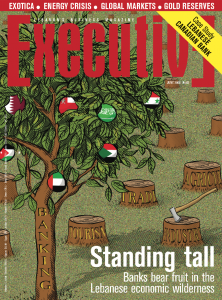
The judicial team charged with discussing the international tribunal to try suspects in the assassination of ex-premier Rafik Hariri leaves for New York for talks on the nature and scope of any future court established to try the crime. Meanwhile, UN Secretary-General Kofi Annan expresses concern at the cross border clashes between Hizbullah and the Israeli army and calls on all parties to exercise maximum restraint. Later, the Israeli Army claims to have killed three Hizbullah fighters who crossed into Israel during clashes with its troops. In a letter to the UN explaining the details of the clashes, Fuad Siniora says that as long as Israel continues to occupy Lebanese territory, Hizbullah will keep up its operations against the Jewish state. Several thousand Hizbullah supporters take to the streets in Beirut’s southern suburbs, burning tires and blocking roads, including the airport highway, in protest against Bas Mat Watan, a TV comedy show that satirized the group’s leader Hassan Nasrallah. Political leaders resume the National dialogue amid rows over the disarmament of Hizbullah. Lebanese leaders once again put off any decision on the issue but agree on a “pact of honor” aimed at defusing tensions between pro and anti-Syrian factions. US Assistant Secretary of State for Near Eastern Affairs David Welch says that “there is a strong presumption” that Syria is responsible for the assassination of Hariri and urges Damascus to cooperate with the investigation. Former Prime Minister Omar Karami announces the formation of the Lebanese National Gathering, a new political front, and sets its first priority as the toppling of the Siniora government. Allied with him are at least 25 pro-Syrian officials. Authorities announce that a burial site in the east Lebanon town of Anjar, originally believed to be a mass grave for victims of Syria’s military presence, is actually a graveyard dating to the 17th century. Speaking at the end of a three-day Maronite synod, Cardinal Nasrallah Boutros Sfeir calls for Lebanon’s Christians to close ranks and urges them to seek better relations with themselves and other Lebanese. Former Lebanese Cabinet Minister Suleiman Franjieh officially launches his new Al-Marada party in his hometown of Zghorta with representatives of Hizbullah, Amal and the Free Patriotic Movement in attendance. Druze leader Walid Jumblat, renews his anti-Syrian vitriol, saying “there will be no settlement, no pact of honor and no peace with the tyrants of Damascus, with those who have violated Lebanon’s independence and killed its free men.” Meanwhile, Abdel-Halim Khaddam, the former Syrian vice president, says he has evidence that the Syrian president Bashar Assad was responsible for Hariri’s killing, telling a Saudi newspaper that he has all the documents that incriminate the illegal policy of the Syrian regime. Solidere approves $100 million in cash dividends ($0.60 per share) to its shareholders after recording a net profit of $108.5 million in 2005. Israeli Prime Minister Ehud Olmert tells French President Jacques Chirac that Israel would pull out of the Shebaa Farms border region if the area officially comes under Lebanese sovereignty. Romania invites Siniora to represent Lebanon at a Francophone summit in Bucharest but does not extend invitation to Lahoud. Ain Mreisseh is shaken by a Saturday night gun battle between bodyguards of President Lahoud’s younger son, Ralph, and those of Walid Jumblat’s stepson following a row over who should go first on a traffic light. Meanwhile, Interior Minister Ahmed Fatfat denies charges by Muslim clerics that the government has approved a gay rights group and two nudist beaches. After much anxious waiting, Lebanese viewers learn they will be able to watch the World Cup on local TV.
July 2006
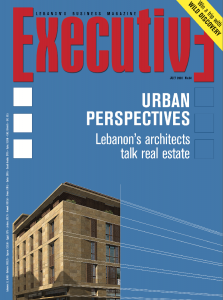
Just as what promises to be a bumper tourist season gets into its stride, Israel launches a massive air, ground and sea bombardment on south Lebanon, Beirut and other areas of the country. The attacks come after Hizbullah fighters capture two Israeli soldiers and kill eight others along Lebanon’s border with the Jewish state. In the first major strike against infrastructure targets, Beirut airport’s three main runways are bombed sending panic-stricken tourists fleeing via Syria and Jordan. Hassan Nasrallah declares “open war” as he emerges unscathed after air strikes on his home and office in Beirut. As Lebanon is increasingly cut off from the outside world and systematically dismantled by Israeli air strikes, the foreign embassies evacuate their citizens, which include many Lebanese with dual nationalities. Shop shelves empty as people scramble to stock up on basic necessities and many Beirut residents seek safety in the mountains. Prime Minister Fuad Siniora declares Lebanon a “disaster zone,” as Nasrallah vows to wage an unrestrained campaign against Israel. For his part, Israeli Prime Minister Ehud Olmert announces “nothing will deter us.” At their summit in St. Petersburg, the G8 group of nations calls on both sides to end the fighting. Thousands of villagers flee the South of the country, seeking refuge in the southern port city of Tyre after Israel orders residents to evacuate the border area, warning of more attacks. Despite urgent appeals for restraint, international diplomatic efforts to halt the fighting fail. US President George Bush blames Hizbullah for the escalating violence and calls on Syria to rein in the group. Middle East Airlines (MEA) announces it is transfering operations to Damascus after the closure of Beirut airport. Siniora tells the international community, “I hope you will not let us down. We, the Lebanese want life. We have chosen life. We refuse to die.” The UN says 500,000 people are displaced in Lebanon. “Our situation is tragic,” declares Lebanese Health Minister Jawad Khalife. “Hospitals across Lebanon are suffering medicine and fuel shortages.” The central bank announces that Lebanon’s currency is stable and its reserves remain liquid. Meanwhile, fierce fighting continues as Israeli ground forces push into Lebanon, heading towards Bint Jbeil. They momentarily capture the town but lose nine soldiers in the fighting. Israeli warplanes also continue raids across Lebanon. In an interview, Nasrallah vows that deeper Israeli incursions will not stop his group from firing rockets into Israel. Asked about diplomatic moves to end hostilities, Nasrallah says: “We do not feel that we are currently interested in discussing ideas or initiatives.” Later in the week however, he announces that “the priority is to stop the Israeli aggression, and when things reach the phase of serious discussions over ideas and initiatives we will be ready to propose our ideas.” US Secretary of State Condoleezza Rice makes a surprise visit to Lebanon to launch further diplomatic efforts to resolve the conflict. After meeting with Siniora, she heads to Israel. More than 20 people are killed, the majority of them children, when Israeli warplanes bomb the village of Qana. There is global outrage and, across the region, angry crowds take to the street demanding revenge. Rice, whose Middle East mission is thrown into turmoil by the attack, once again calls for a ceasefire. Olmert, tells his country there will be no ceasefire. Ex-president Elias Hrawi, who oversaw the implementation of the Taef peace accord and who steered the country through reconstruction between 1989 and 1998, dies at the American University of Beirut hospital. He was 80.
August 2006
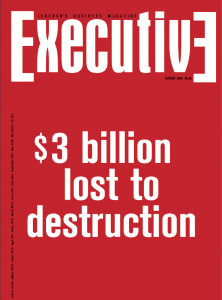
Belief organizations declare the suspension of activities in South Lebanon following Israel’s warning that all moving vehicles will be considered targets. The government announces it will deploy 15,000 soldiers in the south when Israel withdraws. In Jerusalem, the Israeli military announces it wants to broaden its ground offensive then appears to put such a move on hold to allow diplomatic efforts to continue. A ceasefire between Israel and Hizbullah comes into effect at 08:00AM local time on Monday August 14, but not before 42 Lebanese and five Israelis soldiers are killed in the hours leading up the cessation. Israeli Army Radio says the naval and air blockade will remain in effect for the present. Just before the ceasefire, Israeli warplanes drop leaflets over Beirut blaming Hizbullah and its Iranian and Syrian “masters” for the destruction in Lebanon. The timing for the cessation of hostilities was announced by UN Secretary General Kofi Annan two days earlier, following the adoption of Security Council resolution 1701, which had called for the deployment of an international peacekeeping force in South Lebanon. Both the Israeli and Lebanese governments endorse the resolution, but Hizbullah leader Hassan Nasrallah says that while his fighters would abide by any ceasefire, they will continue to fight as long as Israel still has soldiers on Lebanese soil. Israel’s army chief of staff Dan Halutz says that Israeli troops may remain in south Lebanon for months, in response to an assessment by his own intelligence chiefs who say it may take that long for the UN troops to deploy. Still, as Israeli troops pull back to their border, for the first time in nearly 30 years 15,000 Lebanese soldiers take up positions in South Lebanon in line with Resolution 1701. Hizbullah claims a stunning victory despite the losses. Fuad Siniora says the operation will impose the government’s authority on the region south of the strategic Litani river. “There will be a single state with the sole decision-making power,” he says. “There will be no dual authority and there will be no off-limit regions for the army.” Meanwhile, the issue of the legitimacy of Hizbullah’s arms persists. President Emile Lahoud announces it is “shameful” to ask Hizbullah to disarm as it is “the only force in the Arab world that was able to stand up to Israel.” Cars jam roads to the South as thousands of refugees stream back to towns and villages. Sweden says it will host an international aid conference for Lebanon on August 31 with representatives of 60 governments and organizations taking part. CDR boss Fadl Shalak announces that war damage totals $2 billion for buildings and $1.5 billion for infrastructure. Later, talking to New TV, Nasrallah announces that if he had known the capture of the two Israeli soldiers would lead to war, he wouldn’t have ordered it. UN Secretary-General Kofi Annan arrives in Beirut as part of an 11-day tour of the Middle East. He demands that Hizbullah release two captured Israeli soldiers and Israel lift its blockade of Lebanon. Italy agrees to send 2,500 troops to take part in the expanded UN peacekeeping mission in southern Lebanon and approves a $38.4 million aid package. The US also says it is pledging an additional $230 million to help the Lebanese rebuild their homes and return to their towns and communities. Syria’s President Bashar Assad says that he would consider the deployment of international troops along the Lebanese-Syrian border as hostile towards his country. The war leaves at least 1,287 people, nearly all civilians, dead and 4,054 wounded. At least 1,140 civilians—30% of them children under 12—have been killed along with 43 Lebanese soldiers and police.
September 2006
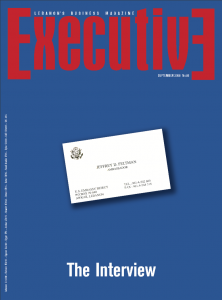
Israel’s blockade of Lebanon continues. France prepares to play a more robust role within UNIFIL by rolling out heavy tanks, artillery and radar systems. US civil rights leader Jesse Jackson meets Hizbullah officials in Lebanon and calls for proof that the two captured Israel soldiers are alive, while Lebanese MPs, led by speaker Nabih Berri, embark upon on a round-the-clock sit-in to protest Israel’s blockade. The Jordanian government initiates a three-month taxes and tariff exemption for Lebanese trucks entering and exiting Jordan. Canada pledges $1.8 million to clean up oil spills off the Lebanese coast and help boost the fishing sector. British Prime Minister Tony Blair arrives in Lebanon for talks with Premier Fuad Siniora. He is met by angry demonstrators gathered in the center of Beirut to protest the UK’s stance on the war. Finance Minister Jihad Azour announces that the war and the blockade have increased Lebanon’s public debt to $41 billion. Hoever, the ratings agency Standard & Poor’s announces that the Lebanese economy and public finances have weathered the impact of the conflict and removes Lebanon from its Credit Watch list. Hizbullah says it would accept UN peacekeepers as long as they stick to defending Lebanon against Israel. However, French commander General Alain Pellegrini hints that his soldiers would disarm the group if the Lebanese army does not. The mayor of Baraasheet, a Hizbullah town 10 kilometers from the Israeli border, issues a warning to the UN soldiers if they try to disarm Hizbullah: “We will inflict even greater losses on them than we did on the Israelis.” Riad Salameh wins the Euromoney award for world’s best central bank governor in recognition for his fiscal management during the war. UNESCO confirms that three of its Lebanese World Heritage sites—Byblos, Baalbek and Tyre—are in urgent need of repair. Hizbullah leader Hassan Nasrallah makes a rare public appearance to address a huge rally in Beirut’s southern suburbs. He rejects calls for Hizbullah to disarm and boasts it has over 20,000 rockets still at its disposal. Nasrallah, hitting out at March 14 alliance, also claims that the resistance is “stronger than ever.” Interviewed on the Orbit satellite channel, Siniora hits back, claiming that Hizbullah caused the “re-occupation” of Lebanon. He also insists that the army will never allow any armed presence along Lebanon’s southern border. Meanwhile, speaking at a rally to remember Lebanese Forces members killed during the 1975-1990 civil war, Samir Geagea challenges Hizbullah and its followers to prove fealty to Lebanon and accept national unity before demanding a new government. In his most recent report, Chief UN investigator Serge Brammertz corroborates the theory that ex-Premier Rafik Hariri was killed by a suicide truck bomb but does not say who ordered it. Mohammed Zuhair Siddiq, a Syrian national suspected of involvement in the assassination of Hariri, claims that both Syrian President Bashar Assad and his Lebanese counterpart Emile Lahoud ordered the killing. Speaking to French newspaper Le Monde, Defense Minister Elias Murr says the government is ready to integrate Hizbullah fighters into a regular army brigade that would patrol villages in the South. At the joint World Bank/IMF annual meeting in Singapore, the World Bank approves a grant of $70 million for a Trust Fund for Lebanon to support the government’s reconstruction efforts. The funds will come from the Bank’s surplus and will not add to the national debt. Turkey says it will provide up to 1.4 billion kilowatt-hours of electricity to Lebanon to make up any shortfall created by the war. Fishermen in the southern port city of Tyre complain that their nets are filled with bombs and missile parts.
October 2006
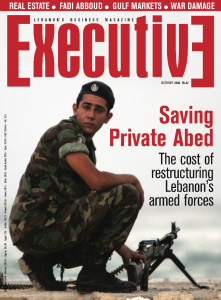
Speaking at an iftar in Beirut, Lebanese Parliamentary majority leader Saad Hariri rejects any change in the make-up of Premier Fuad Siniora’s cabinet following Hizbullah calls for a government of national unity. Lebanese army helicopters begin patrolling the Lebanon-Syria border for the first time in an attempt to prevent smuggling operations, as the UN announces that there are up to 1 million unexploded Israeli cluster bombs in south Lebanon. They kill, on average, three civilians each week. US Secretary of State Condoleezza Rice warns of possible assassination attempts on Lebanese politicians allied to the March 14 alliance. During a brief visit to the Arab state, Siniora thanks the people of Kuwait for their financial assistance after the emirate agrees to deposit $500 million with Lebanon’s central bank and grants Beirut $300 million in post-war reconstruction aid. Malaysia Airlines announces it is resuming flights to Beirut. Israel is accused of stealing water from the Wazzani River. Speaker Nabih Berri visits Saudi Arabia in a bid defuse political and sectarian tensions affecting Lebanon. Speaking to an-Nahar, the leader of the Lebanese Free Patriotic Movement MP Michel Aoun says that he will wear out Siniora and will not let him rest until he leaves office. Six civilians are slightly hurt when a rocket hits a building next to the UN’s Beirut headquarters and Siniora’s offices. Speaking at a news conference to mark the anniversary of the Syrian-led military offensive that ousted him from power on October 13, 1990, Michel Aoun accuses the government of corruption and once again calls for a government of national unity and normal relations with Syria. Later, the government announces it has put together an $80 million package to compensate families whose homes were destroyed in Beirut’s southern suburbs during the war and begins distributing the first state aid for rebuilding the South in a program that will eventually cost $600 million. Meanwhile, Arab finance ministers approve a series of recommendations and measures to support the Lebanese economy and call for strong Arab participation in next year’s international donor conference on rebuilding the war-battered country. Former Syrian Vice President Abdul-Halim Khaddam once again predicts that President Bashar Assad’s regime will collapse and calls on Syrians to prepare for the day when he will be overthrown. As Oman and the EU pledge a total of $88 million to Lebanon’s reconstruction fund, the Central Bank Governor Riad Salameh says he hopes for at least $500 million or more in soft loans from international sources to revitalize the private sector. The Beirut port begins upgrading its cargo-inspection system with the installation of a new mobile X-ray scanner that will speed up the clearance of goods in and out of the country and limit smuggling. Carlos Ghosn, the Lebanese-Brazilian CEO of the Nissan Motor Co. is appointed Honorary Knight Commander of the British Empire for his contribution to the economic development of Japan and Britain. A small bomb is tossed from a speeding car in the Beirut district of Ramlet el-Baida starting a small fire. There are no reports of injuries. Albanian Prime Minister Sali Berisha says his government is willing contribute peacekeeping troops to Lebanon. Sixteen Lebanese women and children who were injured in the war leave Beirut for Italy, where they undergo treatment for their wounds. Beirut MP Ghassan Tueni is shortlisted for the EU Human Rights Prize. The Dutch media circulate reports that Lebanon is among a handful of countries importing Dutch sheep, despite an outbreak of bluetongue disease.
November 2006
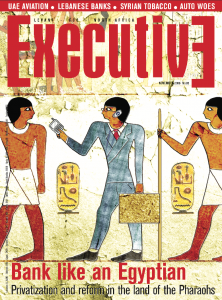
Lebanon’s political leaders meet for the first time in nearly five months with Hizbullah leader Hassan Nasrallah threatening street demonstrations if the round table dialogue fails to produce a national unity government. He accuses the parliamentary ruling majority of seeking to use UNIFIL to disarm Hizbullah, calling the alleged plan “an American-Israeli demand.” MP Ghassan Tueni proposes a parliamentary petition calling for the resignation of President Emile Lahoud as Defense Minister Elias Murr deploys 20,000 troops across Beirut to deal with any civil disturbances and Iran says it is ready to equip the Lebanese army with anti-aircraft weaponry. The central bank predicts that inflation will rise to 7% by the end of 2006. Fransabank becomes the first Lebanese bank to operate in Algeria and the world’s first qualification covering all aspects of Islamic finance is launched in Britain in a joint British-Lebanese initiative. Lebanon signs a $71 million grant agreement with the World Bank for post-war reconstruction. Transparency International announces that Lebanon has witnessed a considerable improvement in perceived levels of corruption, ranking 83rd out of 163 countries. The Lebanese government and the UN release a joint report on the quality-of-life indicators in Lebanon. One of the findings is that the proportion of “poor” families in Lebanon has dropped from 31% in 1995 to 25% in 2004. Five Hizbullah and Amal ministers resign from the cabinet, igniting a constitutional dispute between Lahoud and Prime Minister Fuad Siniora. Environment Minister Yaacoub Sarraf, who is close to Lahoud, also resigns, becoming the 6th cabinet minister to quit. Lahoud claims that the cabinet cannot vote to endorse a UN draft text calling for an international tribunal in the assassination of former Premier Rafik Hariri without a Shia presence. Nasrallah boycotts the government and vows to establish a “clean government.” In talks with speaker Nabih Berri, Iran’s supreme leader Ayatollah Ali Khamenei says the US and Israel will be defeated in Lebanon. Trade unions and syndicate heads urge the country’s politicians to stop bickering and work towards economic recovery. Meanwhile, the hotel owners syndicate warns that street protests will completely ruin the end of year tourism after heavy losses in the summer war. Nasrallah, in a televised speech, urges his supporters and anti-Syrian factions to be psychologically ready for street protests to demand a national unity government. Druze leader Walid Jumblat warns that Lebanon is on the verge of a coup d’état. One day later, Industry Minister Pierre Gemayel and his bodyguard are gunned down in his car in Beirut. He is the sixth outspoken opponent of Syria to be assassinated in two years. At his funeral, attended by hundreds of thousands of mourners, his father, former president Amine Gemayel, announces that the “countdown for the election of a new president has started.” French Foreign Minister Philippe Douste-Blazy and Arab League chief Amr Moussa are among the dignitaries who attend the downtown service. In a message read at the funeral, Pope Benedict XVI condemns the killing, calling it “unspeakable.” Gemayel’s casket, wrapped in flags of the Phalange party and Lebanon, is taken to his home in Bikfaya for burial. Supporters demand that only the army bear weapons and call for the removal of “Caesar of Baabda.” Days later, the government defies its Syrian-backed opponents and approves a Special International Court for Lebanon to try suspects in the assassination of ex-Premier Hariri. The cabinet also refers Gemayel’s murder to the judicial council, the highest trial court in Lebanon. Meanwhile, the opposition says it will wait till the end of the mourning period before going ahead with its threatened campaign of street protests. Aounist and Lebanese Forces supporters clash in Sassine Square in Beirut after Aounists attempt to replace a poster of their leader that had been burned days earlier.

